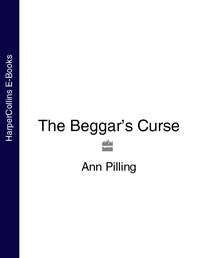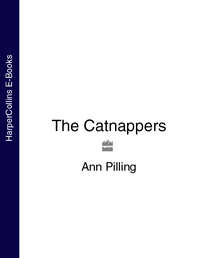
Полная версия
The Empty Frame


The Empty Frame
Ann Pilling

For Joe, with love always
There is no fear in love; but perfect love casteth out fear: because fear hath torment.
1 John 4, 18
The Admiral relates how he was sitting up late one night with his brother, over a game of chess, in a panelled room overlooked by the portrait of Lady Hoby. “We had finished playing, and my brother had gone up to bed. I stood for some time with my back to the wall, turning over the day in my mind. Minutes passed. I suddenly realised the presence of someone standing behind me. I tore round. It was Dame Hoby. The frame on the wall was empty. Terrified, I fled the room.”
from The Story of Bisham Abbey
by Piers Compton
Table of Contents
Cover Page
Title Page
Epigraph
CHAPTER ONE
CHAPTER TWO
CHAPTER THREE
CHAPTER FOUR
CHAPTER FIVE
CHAPTER SIX
CHAPTER SEVEN
CHAPTER EIGHT
CHAPTER NINE
CHAPTER TEN
CHAPTER ELEVEN
CHAPTER TWELVE
CHAPTER THIRTEEN
CHAPTER FOURTEEN
CHAPTER FIFTEEN
CHAPTER SIXTEEN
CHAPTER SEVENTEEN
AFTERWORD
By the same author
Copyright
About the Publisher
CHAPTER ONE
Floss was fed up. She was looking at herself in the mirror and she didn’t like what she saw, neither her mop of dark hair, so frizzy and so coarse (“panscrubbers” a boy had said once) nor her stupid little nose, nor the fact that she was too short to be an actress and seemed to be putting on weight. She didn’t even like her name.
Floss was short for Flossie, and both were short for Florence. She hated all her names this morning, she wanted something dignified and mysterious, a name like Hepzibah or Beatrice, something with history behind it.
“Sam, what do you think Lady Macbeth’s name was?” she asked her brother, who was sprawled across the floor looking at a map. He too was stocky and short and he too had pan-scrubber hair, though it didn’t seem to bother him.
“Dunno. Mavis I should think.”
Floss threw her book at him. It was Mum’s Complete Shakespeare, it was big.
“Ouch! For heaven’s sake, Floss.”
“Sorry.” She rescued the book, relieved to find that it was still in one piece. “It’s just that I’m so depressed. I’ll never get this part. My hair’s not right and I’m too short. They’ll give it to Anna Houghton. She’s tall and she’s got the most brilliant hair.”
“Looks aren’t everything,” Sam said. “Anna Houghton’s dim, anyhow. I bet she doesn’t understand what the play’s about. Which bit are you doing, anyway?”
“The sleepwalking scene, where she comes on wringing her hands, when she can’t get rid of the guilt about them having murdered the old king. It’s funny, when they actually kill him she’s the strong one. Macbeth behaves like a real wimp. But when things start catching up with them she’s the one that goes mad.”
“And what happens?”
“She kills herself – but not on the stage.”
“Glad about that,” Sam said. “I don’t fancy watching you do that to yourself. Go for it anyhow, that’s what Mum and Dad said. I bet you’ll get it.”
Floss curled up again in her chair and tried to get the lines into her head. Their year was putting on Scenes from Shakespeare for the school’s Christmas drama competition, and she wanted to be Lady Macbeth. She had planned to get the part word-perfect by the end of the summer holiday, but now they were going away and she wasn’t sure she’d be able to learn all the lines. Perhaps she’d relax, instead of swotting up Shakespeare. The audition might be too nerve-racking. Anyhow, there was Magnus. Mum and Dad had said they must look after him.
“Do you think it’ll be all right, going away with Magnus?” she asked Sam. At first he didn’t answer, merely crouched lower over his map. Magnus, the boy their parents were fostering and who now lived with them, was a subject they found it difficult to discuss. They both had strong feelings about him.
“It’s on a river,” he said, “quite a big one. It looks like a tributary of the Thames. There’ll be boats I should think. It’ll be great if this hot weather keeps up. There’s a swimming pool too.”
“But what about Magnus? I don’t think he can swim.”
“He’ll be fine. We can teach him,” Sam said easily. He was the unflappable type, a good foil for Floss who tended to panic.
“What do you really feel about Magnus living here?” Floss asked him, shutting the book. She was definitely abandoning Shakespeare for the day.
Sam folded his map up, very precisely and slowly. Then he took in a deep breath and let it out, also very slowly. “I’m not sure,” he said. “It’s not that I don’t like him. I mean there’s nothing to dislike, is there? He hardly ever speaks.”
“No, but when he does it’s something he’s really thought about. Have you noticed? I think he’s rather clever.” The truth was that Floss thought Magnus quite amazingly clever. When he came out with his quick, precise observations she felt like a dinosaur plodding around in gum boots.
“Well of course he’s clever,” Sam said. “But then, his father was some kind of genius wasn’t he, in a university?”
“I think so. I wish we knew a bit more, though. I mean, I know it’s awful, how he’s been treated, but we’ve got to live with him.”
“Well, I’m not sure I’d go round telling people about my mother going to pieces, when my father had just walked out without a word, and had never come back. They sound weird. That’s when his mother started doing strange things, and ill-treating him, according to Dad.”
“But why did nobody know?”
“Well, I think she, sort of, withdrew from everybody, with Magnus. She actually went to live in another town, where no one knew her. His father had been teaching him at home, so his school wouldn’t have missed him and I suppose outsiders didn’t want to barge in. I mean, they must have been very respectable, not the kind of people social workers are asked to investigate, unless someone tells them to.”
“And nobody did?”
“No, not until it was too late, not according to Mum and Dad.”
“I wonder why the father walked out?”
“Dunno, but I don’t think he went off with someone else. Dad said he’d got very stressed-out, about his work, he said it was all that mattered to him. He was obviously an unbalanced kind of person. That’s why he pushed Magnus so hard, at his lessons. I should think it’s why he won’t always co-operate now, at school. He’s digging his heels in. Don’t blame him either.”
“He’s getting a lot better though.”
“Yes, I know.”
“But why didn’t the mother protect Magnus more? That’s what mothers do.”
“Perhaps she was frightened of the father. She can’t have been very tough, she’s had some kind of mega mental breakdown now, that’s why he can’t go to see her.”
“Poor old Mags. You do mind him being here though, don’t you, Sam? Why?”
Sam sat back on his heels. “I don’t know,” he said. “I didn’t think it would matter so much. I know Dad and Mum care about us just the same but it feels different now, that’s all. It’s how I feel. I can’t help it.”
Floss said, “But Sam, he cries in the night, he really sobs. It’s awful.”
“I know.”
“The fostering person told Mum and Dad he’d been beaten, and shut in cupboards, things like that. And when she was ill his mother made him do all the housework. He was only little, it went on for ages. How could she?”
“I’ve told you, because she was sick, in her mind. They don’t keep people in hospital for nothing. They must think Magnus is better off with us, for now.”
Silence fell in the shabby, familiar sitting room. Privately, both sister and brother had minded the coming of Magnus, an eleven-year-old boy to whom these terrible things had happened, but they’d promised their parents that they’d try to make him feel welcome. And they were trying. It was hard though, with somebody so unresponsive.
“He won’t be with us for ever,” Floss said firmly.
“No.” But Sam didn’t sound very convinced. His parents had big hearts. He suspected they would hold on to Magnus, if it was humanly possible.
“Well, this holiday might help,” Floss said, perking up. She had more or less decided not to audition for Lady Macbeth and at once she felt a lot more cheerful. “Tell me where we’re going, again.”
“Why don’t you look it up for yourself?” Sam said, putting his map inside a folder labelled ABBEY in neat, square printing.
“I’ve not had time, with the play and everything. Come on.”
“Well, I’ve told you, it’s on a river,” Sam said. “Mum’s cousin sent that booklet about it, you could have read it.” But actually he quite liked telling Floss things. She was cleverer than he was, though not in the same league as Magnus. “It started as a kind of religious house, for pilgrims travelling to shrines. They used to stay there on the way.”
“Sort of – mediaeval bed and breakfast?”
“Yes. But they said prayers for you.”
“Then what happened to it?”
“Well, according to the book some monks took over, Henry the Eighth chucked them out in the end. He seems to have got quite fond of the place himself. He could sail down to it from London, on the river. Queen Elizabeth slept there too.”
Floss snorted. “Come off it. Surely you don’t believe that.”
“Why not? She slept everywhere.”
“Well, that’s what I mean. So how did Mum’s relation come to own it?”
“I’m not sure she does own it, not the whole place. There’s a man called Stickley. He’s related to her and he’s the one that seems to run it. I think it was left to them both in a will.”
“Stickley…” Floss mused. “It sounds horrible. So why did they turn it into a sports centre? It must have been gorgeous once, from that picture Mum showed us.”
“They needed money to keep it going, I suppose. At least they still live in it. Anyhow, we’ll have the run of the whole place, with luck. There’s a swimming pool, and tennis courts, and all those keep-fit machines.”
“Ugh,” said Floss.
“It might get your weight down,” Sam said slyly. “I don’t suppose Lady Macbeth went to Weight Watchers. All that wringing of hands – she was probably anorexic.”
Floss picked up the Shakespeare. This time she really would throw it at him. But then she put it down again hurriedly. Someone had crept into the room, switched on the television and was sitting in front of it, perched very neatly on a bean bag.
“Hi, Mags,” she said to the small humped figure. “Are you all packed up? The taxi’ll be here soon.”
“Yes.”
“Put in your swimming things?” Sam said. “There’s a pool and there won’t be anyone else there, with luck.”
Magnus didn’t reply but stared at the television screen on which some politicians were arguing about the dumping of nuclear waste. He was odd. He often watched the most boring programmes but if you looked closely you could see that he wasn’t watching at all but staring beyond the screen, thinking his own private thoughts.
“Come and talk to us, Mags,” Floss said gently, switching off the TV and joining him on the bean bag. As she squished down, some white pellets seeped out of a hole. Magnus picked them up and put them carefully on the mantelpiece. “It needs mending,” he said, “or it’ll get worse. I could sew it up, while your mother’s away.”
“Yes, but listen, you don’t have to. She doesn’t expect you to do things like that.”
Magnus liked doing little chores but their mother tried to discourage him. His own mother had made him do the housework. Theirs wanted him to have some childhood, before it was too late.
He was nearly twelve now, two years younger than Floss and three years younger than Sam. He was short too, like them, but very thin and bony. Now and again Floss tried giving him little hugs but he didn’t seem to like them, and besides, it was like putting your arms round the frail and delicate skeleton of a tiny bird. You felt he might crack. He had fine pale hair, an ashy gold, and deep brown eyes.
“Lovely colouring,” Mum said, the night he arrived. “He’ll break a few hearts, he’s going to be absolutely gorgeous.” And Floss, fighting with unexpected jealousy, had said “Yes”. (Nobody had ever said she was gorgeous.) But Magnus had turned away his face.
The journey to the Abbey took much longer than they had expected because they had to go on three separate trains, zig-zagging down the country. They were on their own, with Sam in charge, and they had their instructions. If anything went wrong, or they got separated, they had to phone Cousin M at the Abbey, or the airport hotel where their parents were staying. They flew out next morning to a flat in Majorca which Cousin M was lending them for a holiday. Magnus could have gone with them, he was very attached to Mum. But he’d decided to go off with Sam and Floss instead, which had pleased everybody because the main purpose of Mum and Dad’s going away had been to leave the three children to get to know each other.
It was nearly dark when a taxi drove them into the Abbey grounds. Magnus had fallen asleep and the others were trying hard not to. They were keen to see everything but it had been a very long day and they were even more keen to drop into a comfortable bed. As the taxi crunched up a long gravelled drive towards a dark hump of buildings, an owl hooted and bats swooped down towards the windscreen, then away. Sam felt excited. “It’s like a film set,” he said, “it’s brilliant!”
“Mm,” Floss muttered. She wasn’t sure. It seemed a bit spooky to her. And why had Mum’s cousin sent a taxi for them, instead of coming herself? That didn’t feel very friendly. But then she too felt a little tug of excitement. She could smell water, a lovely river smell.
The taxi stopped in front of a great arched doorway, flood-lit, with tubs of flowers on the steps. They glimpsed low buildings of pinky-yellow stone stretching away on both sides, ending in the black humps of trees pricked out by a few lights that seemed quite far away, perhaps across the invisible water.
While the driver pulled out the bags they clambered out and shook themselves straight. Magnus was still half asleep and swayed slightly as they stood waiting in the strong light while someone, dashing out, paid the taxi man and waved him goodbye. Floss half put her arm round him but she felt him shrink away. “Sorry…” she muttered. She really must remember that he didn’t like to be touched.
Then, “My dears,” said a voice, “so sorry. I had it all planned, reception committee at the station, et cett, then you got held up. Wretched trains.”
“I did phone,” said Sam. He was rather pleased with himself, getting the three of them safely halfway across England.
“My dear, of course you did, only then – Cecil. Well, it delayed his meal. Then I lost Arthur. Then a man from Shell telephoned, to try and book a conference – good news of course, but it made me even more behind. I just thought a taxi would be quicker. Now come in, for goodness’ sake. There’s food all ready. The luggage can go up later. Come and get warm. It’s always cold in this part of the Abbey.” She laughed. “I’m afraid there’s a price to be paid for all this antiquity. Still, we’ve got a good fire going.”
As they went in, under the pointed doorway, there was a click and the flood lights faded into darkness, pulling a curtain across the tantalizing theatre set of ancient glowing stone, of pillars and arches and stubby towers, of great silent trees. A huge door was pulled shut behind them and two massive bolts driven home.
“This is the original door, dears,” said the fat and friendly woman who had got to be Cousin M. “It must be eight hundred years old, if it’s a day. Now then, food.”
But Magnus interrupted. He said, “I think I’d like to go straight to bed, please.”
The woman stopped, looked at the three of them, and considered. Only then, in the low, pillared entrance hall, did Magnus, Floss and Sam get their first proper look at Cousin M and she at them.
They saw a bulky, dishevelled woman of sixty wearing mud-spattered wellington boots, jeans and a baggy sweatshirt covered with meadow flowers, and the words “Worth Protecting”. Of course, Floss was thinking, she’s a gardener. That’s what she does here. Cousin M had a plain no-nonsense face, a firm jaw, a straight, biggish nose and widely-spaced eyes of the most stunning dark blue. Floss envied these on the spot, and the hair too, which was still fair and extremely thick. It was gorgeous, heavy hair, the hair of an aspiring Lady Macbeth. But Cousin M obviously didn’t care about it. It was tied back sensibly and caught up in an old scarf.
She saw a brother and a sister so alike they could have been two peas out of one pod – shortish and square, with the same coarse, dark hair and alert rosy faces with humour playing round the mouth. That came from their mother, her younger cousin Margaret, of whom she had always been very fond. It was great that her seaside flat had been free for their little holiday. Margaret would go picking up lame ducks though, and her latest thing was fostering this child. Cousin M wasn’t at all sure about the wisdom of such an idea. Still, she liked children and these three would certainly liven the old place up.
Magnus, the foster son, was not big but he had long hands and feet which suggested he might grow tall if someone could get enough food inside him, enough sleep and enough fun… Enough love, love that wouldn’t keep getting snatched away as he was moved from one household to the next, but poured down on him steadily, like the warmth of the sun. She knew all about what had happened to him.
“You can go to bed in two ticks, dear,” she told him, ushering them into a chilly, raftered hall hung with paintings. It was dimly lit and the pictures were not much more than dark rectangles. Light came from two standard lamps set at either end of a huge polished table which stood in front of a blazing fire laid in a grate so enormous and so elaborately carved it was like a room in its own right. A coat of arms hung above the fireplace and above that a curious black waisted clock, the shape of a legless person with a gigantic round head. It was just nine o’clock. Incongruous amid all this ancientness, was an electric food trolley on casters. Out of this Cousin M produced hot bacon sandwiches, chips and warm buns. Floss and Sam fell on the food but Magnus shook his head.
The woman studied him quietly for a minute, then she drew him gently towards her. Floss took in a sharp breath, waiting for Magnus to push the stranger away, but to her great surprise he sat beside Cousin M on the floor, meek and unprotesting, with his head against her knees. Normally, he shrank away from people, as if anyone who approached was bound to hurt him.
“Floss, Magnus and Sam… wonderful names,” Cousin M said unexpectedly, surveying them all.
Floss said shyly, “Is your name Emily… or Emma? Mum never told us what the M was for.”
“Emma? Heaven’s no it’s – promise you won’t laugh?”
They promised, even Magnus. He wasn’t asleep but, from his place of safety against Cousin M’s knees, was peering up at the portraits. One was much larger than the rest, the picture of a woman with very white hands and a very white face.
“My name’s Maude.”
In spite of himself, Sam snorted. This was catching and Floss found herself tittering.
Cousin Maude laughed too. “I know, it’s hideous. I blame my mother, she really should have known better. She was a Maude too. She was friends with Gertrude Jekyll.”
“Jekyll and Hyde…” muttered Sam. It was one of the creepiest stories he had ever read, about a man who had two personalities, and whose wicked one eventually took over the good one.
“Oh no. Gertrude Jekyll was a very famous gardener. But Gertrude’s a pretty hideous name too, don’t you think?”
Floss said, “Well, my real name’s Florence and I absolutely hate it.” She felt much reassured by Cousin Maude, they both had hideous names and they both had a weight problem. What she most liked about her was the way she was looking after Magnus, as if she understood all about his troubles and his shyness, without having to be told.
Suddenly, he came to life. “Who’s that lady?” he said, pointing to the portraits.
At first Cousin M didn’t answer. It was very quiet in the vast timbered hall, no sounds but the leap of flame round burning logs, the snap of the fire and a series of clicks as the electric trolley, now unplugged, cooled down. Sam couldn’t understand why it felt so cold, the fire was huge but there was a definite chill all round them.
They waited and eventually Cousin M got up, walked across the floor and pressed a switch.
A strip light over one of the paintings flickered into life then steadied, and the three children stared. The picture was enormous, dwarfing all the others. A heavily-ornamented gilt frame, wreathed in leaves, flowers and berries, contained the full-length portrait of a young woman. She was dressed all in black except for a long white stole, like that of a priest, which was draped round her neck and fell on both sides to the hem of her dress, ending in gold fringes. She held black gloves, similarly fringed, and there was a little dog at her feet which, like her hands, looked impossibly thin and narrow.
“Is it Elizabeth the First?” said Floss. “She’s got red hair and her face is – well, it looks awfully like her.”
“No. But they were friends,” Cousin M said. “The Queen stayed here, when she was young, in fact they made a special Council Chamber for her, she came so often. You can see it tomorrow. That’s why there’s a coat of arms over the fireplace.”
“That dog’s cowering,” Sam said.
“I’m not surprised,” Floss muttered. “She has rather a cruel face. She looks—”
“Calculating?” Cousin Maude suggested.
“Yes. That’s exactly it.”
“Tell me about her,” said Magnus. Cousin M had come back to her seat by the fire. He’d moved to a rug and was sitting on it, cross-legged, staring intently into her face. What he’d said sounded a bit like a royal command and he had a fixed staring look of total concentration on his face, which Floss and Sam had become familiar with.
Cousin M looked down at him. “I don’t know very much, dear. Her first husband was much older than she was and very ambitious, I suppose that’s why there’s this connection with royalty – I think they had a kind of mini-court here, in the summer.”
“But she looks ambitious,” Floss said.
“She does. But I think she mellowed in her old age. The husband was a bit of a tyrant and I think she probably went along with it all. They do say she did things she lived to regret.”
“What things?” demanded Magnus.
Cousin M blinked up at the portrait. “I really couldn’t say, dear, it’s all speculation, it all happened so long ago.”
“What happened?”
“I honestly don’t know what those two got up to.” She laughed. “I’m just the gardener round here.”
Nobody was fooled. Whatever Cousin M knew she was going to keep to herself.
Magnus’s eyes followed her as she went to switch off the strip light. “She has cruel hands,” he said, as the portrait disappeared into the shadow. “They’re like spikes.”







